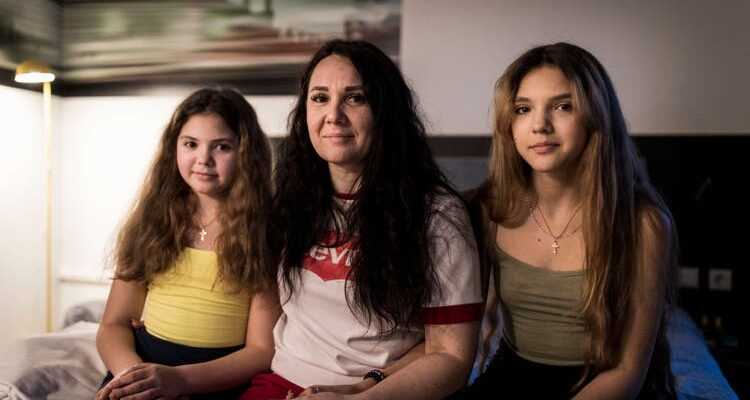Tens of thousands of Ukrainian women are reaching the German capital these days. Her relatives in Russia didn’t believe her that there was a war, says one woman. Putin’s propaganda is stronger.
Marina (centre) and her two daughters Margarita (right) and Xenia are happy to have arrived safely in Berlin. They were overwhelmed by the helpfulness of the Poles and the Germans.
If you talk to Ukrainian refugees in Berlin these days, you will meet overtired people who are happy to have gotten away, but many of them have retained a certain happiness and confidence: by the helpfulness of the Poles and the Germans, which they have shown in the past days, they report with shining eyes.
“It’s like we’re all one big family,” says 34-year-old Marina, who arrived in the German capital on Wednesday morning with her two daughters, Margarita, 14, and Xenia, 12. The three of them were on the road for about three days; on the morning of February 28 they set out from Kharkiv, a large city near the Russian border about 500 kilometers east of Kyiv.
Now Marina is sitting with the two girls in a room in an apartment building in Berlin-Kreuzberg, where craftsmen and business people normally stay. They had to walk the first seven kilometers because buses and trams were no longer running in Kharkiv. Bombs fell to their right and left.
It took them 22 hours to get to Lviv, the big city in the west of the country, because because of the attacks, the train they finally took had to take a different route than usual. In Lviv they boarded a special train that took women, children and foreign students out of the country. ‘People were standing in the corridors; we had to wait seven hours at the Polish border», reports Marina. Volunteers brought them water and food.
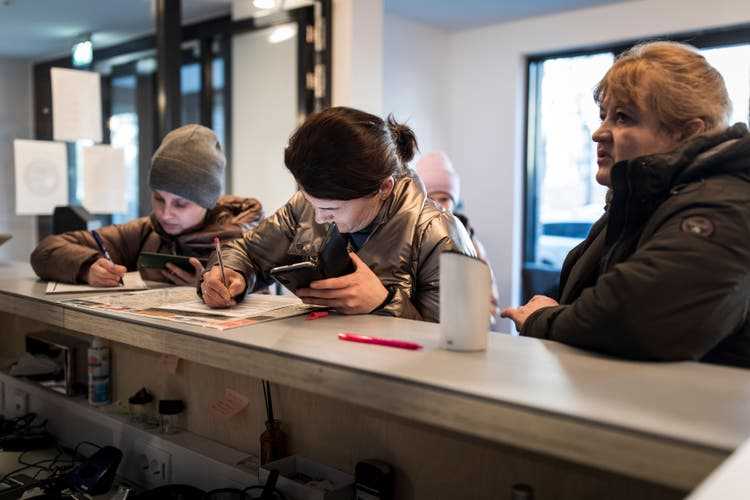
Ukrainian refugees arriving at the Berlin apartment building where they will live for the next few days. Some of them were away for three days or more.
The girls worry about their father in Kharkiv
Marina has been divorced for years and is raising her two daughters alone; her ex-husband is still in Kharkiv. Men of military age, i.e. between the ages of 18 and 60, are no longer allowed to leave Ukraine. Margarita and Xenia keep in touch with their father via Whatsapp; he has not yet decided whether he wants to fight soon or help in some other way.
Her mother, her sister and their two-year-old son have withdrawn to a basement in the hard-fought Kharkiv, says Marina; another sister lives with her two children in a place that the Russians have occupied and can’t get out. They kept in touch via Whatsapp.
«Relatives of mine live in Russia and Crimea; they don’t believe us that there is a war, even though I sent them pictures from Kharkiv», says Marina. Trust in Russian propaganda is apparently stronger. Everything in her hometown is being destroyed, even historic buildings that survived the Second World War. “Putin is now taking revenge on the city because, unlike in Donetsk or Luhansk, hardly anyone in Kharkiv wanted to become Russian,” she says.
In Kharkiv she worked at a gas station; She doesn’t know what will happen to her and her daughters in Germany. “The girls asked me where we were going. I couldn’t tell them.” Now they are afraid for their father, but are relieved to be in a place where it is as quiet and safe as here.
The onslaught could not be managed without private help
Julia, a 35-year-old Ukrainian who has been living in Berlin for several years, accompanies us as a translator. She is also worried about her family. Her grandmother and father lived near the Moldovan border in the southwest of the country; the Moscow-backed puppet republic of Transnistria, home to more than 1,000 Russian soldiers, is not far away. “My father will be sixty next week, then he could go, but he doesn’t want to,” says Julia. He has to take care of his 83-year-old mother, who suffers from diabetes.
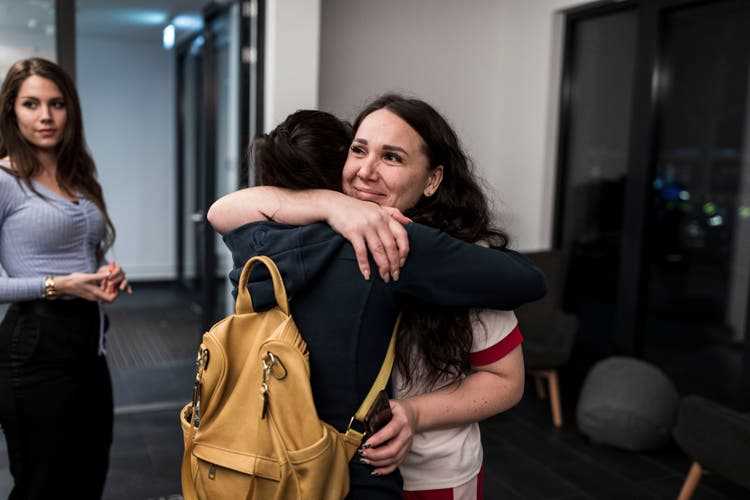
Marina thanks the Ukrainian interpreter Julia; on the left in the picture an employee of the apartment building in which Marina has stayed with her two daughters.
About 5,000 Ukrainians arrived in Berlin during the night from Tuesday to Wednesday; on Wednesday there were another 20,000, and the influx continued on Thursday and Friday. He accommodated 50 people here and in two other buildings, explains Florian Wichelmann, who runs the apartment building. The refugees stay here for two to three days, after which they are accommodated in other hostels, which are also private. Together with other entrepreneurs, Wichelmann the “Every bed helps” initiative started. Berlin could not cope with the onslaught without volunteers.
In the foyer of the apartment building sits a 59-year-old petite woman who wants us to call her Macy; she looks visibly upset. She was born in Iran, married to a Ukrainian and has been a Ukrainian citizen for several years. “It’s hard for me to talk about the last few days,” she says. She comes from Mikolajiv, a city of 500,000 people about 50 kilometers east of Odessa. Her husband believed the Russians were only threatening and would not invade in the end.
‘I told him we should go west but I couldn’t force him. He said nothing would happen.” Maybe, she says, he just wanted to calm her down. Finally they went to Lviv. Shortly thereafter, Russian paratroopers landed in Mikolayiv and the city’s railway station was destroyed.
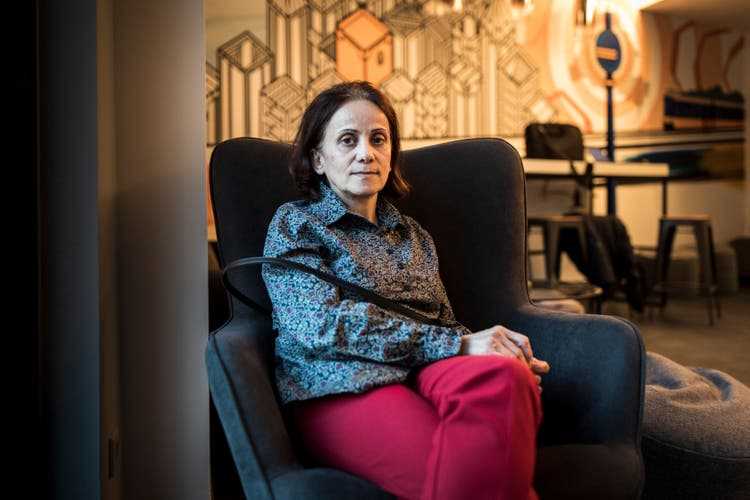
Macy fled the southern city of Mikolayiv with her sister. The 59-year-old had to leave her husband behind in Lviv.
Escape for the second time
Her husband is also 59, says Macy. At first it was said that the military didn’t need him, but then they wouldn’t have let him leave the country after all. They were separated from each other in Lviv. Macy, who has no children, traveled on with her younger sister. The train they took in Lviv was completely overcrowded; they stood in the station for thirty hours before he finally left. From Przemysl in eastern Poland they then continued by bus to Berlin, which took another thirteen hours. You can still see her exhaustion.
A family of ten has gathered in one of the apartments. She hails from a Central Asian country; from which, so asks Alischer, the head of the family, we should not write. They are doubly refugees: in his homeland he worked for the government. Because he refused to become an informant for the secret service, he was tortured. Alisher pulls back his trousers and shows stigmata; these, he says, were from electric shocks. He asks us to only show the family from behind.
The women of the family wear headscarves and remain silent. Alisher speaks; sometimes his son Timur interjects something. On Tuesday morning they left Lviv, where they had lived until then, says the father, and arrived in Berlin on Wednesday afternoon. The sirens in Lviv wailed every three hours; No bombs fell, but since they lived on the top floor, they no longer felt safe. “We saw on TV that Poles were helping incoming Ukrainians, so we thought the situation must be serious.”
Relatives from the hard-fought Kharkiv now lived in her apartment in Lviv, says Alischer. While they themselves left the country with Ukrainian refugee passports, their relatives have Ukrainian citizenship, so that the men among them who are able-bodied are no longer allowed to leave the country. Although they are recognizable as Muslims, they have had no problems either in Germany or in Poland. “Everyone was very generous, here in Berlin a Turkish taxi driver gave us money.”
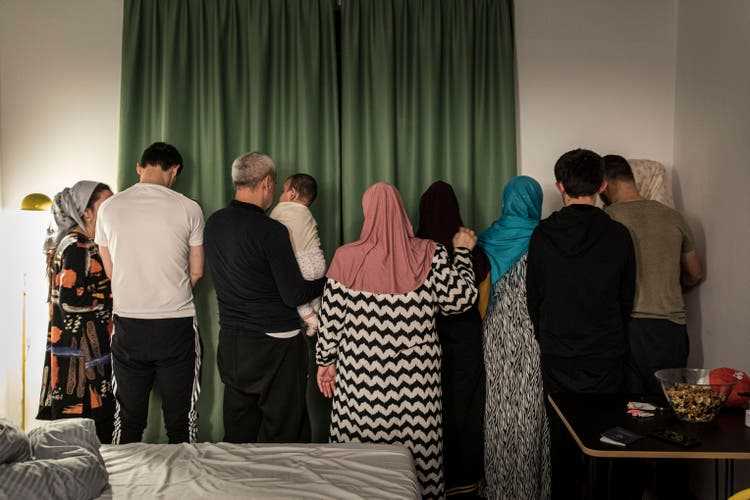
A family from Central Asia in Berlin. Until recently, most of them lived in Lviv. In order to be safe from the government of their home country, the head of the family, Alischer (3rd from left), asks that his relatives and him only be shown from behind. Far right Alisher’s son Timur.
Timur says his grandfather in Central Asia believes the Russians have almost won the war. People there only watched local and Russian TV. Timur is a doctor and until recently lived in Kyiv with his wife and seven-month-old son. “Our neighboring house was one of the first to be destroyed,” he says. Because parts of the metro had been closed for safety reasons, they had to walk twenty kilometers with the baby in their arms to the station to catch the train to Lviv.
Lies that feel like reality
Alischer offers us nuts and dates; he traded it in Lviv. Because of the Kremlin’s propaganda, the Russians are unable to see their guilt, which is a big problem, he says. «I am convinced that Putin is lost even if he wins. He is an old, sick man.” Does Putin have to die so that there can be peace? “Yes!” Alisher exclaims, but then he thinks again and says: “Perhaps.”
According to Alischer, after Putin, another, new Putin would come. “The presidents lie, then the people around them lie, and at some point it feels like reality.” The only hope is that Russia will weaken over time.
The women remain silent, and after three quarters of an hour Alischer asks us to leave: they have only slept two hours in the last day and a half. When we say goodbye, we ask him whether he thinks that there will be peace soon. “We pray for it, but we don’t believe in it,” he says.
The names of the Central Asian interlocutors were changed at their request.
